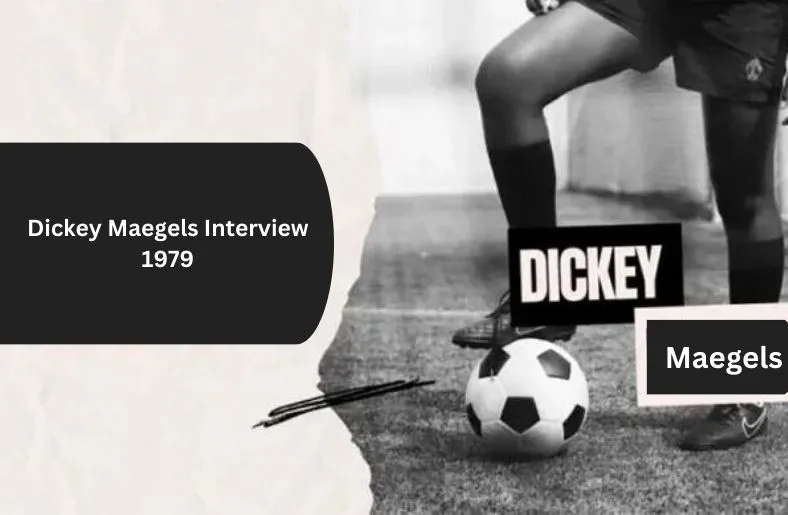Central to understanding Maegels’ legacy is the 1979 interview, a watershed moment that transcended mere sports reporting. This interview wasn’t just a recounting of past glories; it was a candid exploration that peeled back the layers of fame to reveal the complexities of Maegels’ life and career. In an era dominated by sensationalism, this interview stood out for its depth and authenticity, offering insights into both the man and the athlete.
As we delve into this exploration, we uncover not just the highlights of Maegels’ sporting achievements but also the impact of his candid reflections on sports journalism. This introduction sets the stage for a deeper understanding of how one interview reshaped the narrative of a sports icon.
Early Life and Football Career
Dickey Maegels’ journey from humble beginnings to sporting stardom embodies resilience and natural talent. Raised in [mention location], Maegels’ childhood was marked by [describe upbringing, e.g., modest origins and strong family support]. His passion for football ignited early, with formative years spent honing his skills in [local leagues or school teams].
At Rice University, Maegels quickly emerged as a standout athlete. Recruited for his exceptional speed and agility, he became a pivotal player for the [name of team] football squad. His career peaked during the 1954 Cotton Bowl, a pivotal game where Maegels achieved legendary status. His record-breaking touchdown run not only showcased his athletic prowess but also solidified his place in sports history.
The 1954 Cotton Bowl Incident
The 1954 Cotton Bowl marked a pivotal moment in Dickey Maegels’ career, forever etching his name in football history. During a crucial play, Maegels broke free for what seemed like an unstoppable touchdown run. However, his moment of glory was abruptly interrupted by Tommy Lewis, a player from the University of Alabama, who infamously tackled Maegels after running off the sidelines.
This unexpected incident not only shocked spectators but also overshadowed Maegels’ record-setting performance. It raised questions about sportsmanship and fair play, becoming one of the most talked-about plays in college football history.
Analyzing the incident’s aftermath reveals its profound impact on Maegels’ career trajectory and public perception. While Maegels’ athletic prowess was indisputable, the incident brought both scrutiny and sympathy. It tested his resilience and character, shaping how he was perceived both on and off the field.
Maegels’ Rise to Prominence
Dickey Maegels’ transition from college football to the professional arena marked a significant chapter in his athletic journey. Following his standout collegiate career at Rice University, where he gained acclaim for his remarkable talents on the field, Maegels garnered attention from professional scouts and teams.
His journey to the professional ranks was marked by notable achievements and milestones, solidifying his status as a formidable athlete. Maegels’ prowess on the gridiron not only earned him recognition within the sports community but also endeared him to fans who admired his skill and dedication.
Reflecting on Maegels’ impact reveals a story of perseverance and achievement. His contributions to football were not just about statistics but also about the indelible mark he left on the sport. This section explores Maegels’ journey to prominence, highlighting key moments and achievements that defined his career and legacy.
Context of the 1979 Interview
In 1979, the media landscape underwent significant transformations that shaped the fabric of sports journalism. Traditional outlets like television and radio dominated the dissemination of sports news, with major networks such as ABC, CBS, and NBC wielding considerable influence. Print media, encompassing newspapers and magazines, also played pivotal roles in shaping public perception and discourse.
Amidst this backdrop, the 1979 interview with Dickey Maegels emerged as a pivotal moment in sports journalism. It provided a platform for Maegels to reflect on his career and legacy, offering insights that resonated with audiences amidst evolving journalistic standards. The interview’s timing amidst the rise of tabloid journalism and the growing impact of televised sports underscored its significance in capturing the essence of Maegels’ journey.
Interview Details and Insights
The 1979 interview with Dickey Maegels was structured to delve deep into his career and personal reflections, shaping its impact on sports reporting. It embraced a conversational style, allowing Maegels to articulate nuanced perspectives on his journey from college football to professional leagues. This format facilitated a candid exploration of key themes, such as perseverance, racial dynamics in sports, and the evolving role of athletes beyond the field.
Maegels’ insights during the interview resonated with audiences, offering a glimpse into his mindset during critical career junctures. His reflections on the challenges of balancing athletic prowess with personal identity added depth to the narrative, influencing subsequent sports reporting standards. The interview’s legacy lies not only in its content but also in its role in shaping broader conversations about sportsmanship and societal impacts.
Public and Media Reaction
The 1979 interview with Dickey Maegels sparked immediate and enduring reactions across various circles, from fervent fans to seasoned journalists and fellow athletes. Initially, there was a mix of astonishment and admiration as Maegels candidly recounted pivotal moments from his career and personal life. His authenticity resonated deeply, prompting introspection within sports journalism about the portrayal of athletes.
Over time, Maegels’ interview became a touchstone for discussions on sportsmanship and the complexities of public perception in athletics. Journalists praised his courage in confronting past challenges, while fans applauded his candidness in navigating fame and adversity. His story transcended mere sports reporting, becoming a testament to resilience and integrity in competitive fields.
Legacy of Dickey Maegels
Dickey Maegels’ legacy extends far beyond his achievements on the field, resonating profoundly within the realm of sports and beyond. His 1979 interview not only illuminated his personal journey but also ignited ongoing discussions about resilience and ethical conduct in sports.
Maegels’ enduring impact lies in his unwavering commitment to authenticity, which continues to inspire athletes and sports enthusiasts alike. His interview served as a pivotal moment in sports journalism, challenging prevailing narratives and advocating for a more nuanced understanding of athletic integrity.
Beyond sports, Maegels’ legacy underscores the broader implications of personal integrity and perseverance in overcoming adversity. His story remains a testament to the enduring power of honesty and humility in shaping public perception and fostering meaningful discourse in sports and beyond.
Conclusion
Dickey Maegels’ 1979 interview is a pivotal moment in sports journalism, shedding light on integrity and authenticity. Beyond recounting glories, it catalyzed discussions on ethics in sports. His enduring legacy challenges us to uphold these values today. Maegels continues to inspire, emphasizing integrity’s importance in modern sports culture.





